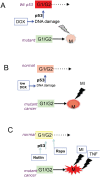Wt p53 impairs response to chemotherapy: make lemonade to spare normal cells
- PMID: 22802145
- PMCID: PMC3442293
- DOI: 10.18632/oncotarget.548
Wt p53 impairs response to chemotherapy: make lemonade to spare normal cells
Abstract
As published recently in Cancer Cell, p53 impairs the apoptotic response to chemotherapy and clinical outcome in breast cancer. I discuss that, while treating tumors lacking wt p53, this phenomenon can be exploited to protect normal cells from chemotherapy because all normal cells have wt p53. Also, several therapeutic paradigms can be reassessed, including the role of cellular senescence in cancer therapy.
Figures

Comment on
-
p53-mediated senescence impairs the apoptotic response to chemotherapy and clinical outcome in breast cancer.Cancer Cell. 2012 Jun 12;21(6):793-806. doi: 10.1016/j.ccr.2012.04.027. Cancer Cell. 2012. PMID: 22698404 Free PMC article.
References
-
- Blagosklonny MV, Pardee AB. Exploiting cancer cell cycling for selective protection of normal cells. Cancer Res. 2001;61:4301–4305. - PubMed
-
- Demidenko ZN, Halicka D, Kunicki J, McCubrey JA, Darzynkiewicz Z, Blagosklonny MV. Selective killing of adriamycin-resistant (G2 checkpoint-deficient and MRP1-expressing) cancer cells by docetaxel. Cancer Res. 2005;65:4401–4407. - PubMed
-
- Demidenko ZN, Vivo C, Halicka HD, Li CJ, Bhalla K, Broude EV, Blagosklonny MV. Pharmacological induction of Hsp70 protects apoptosis-prone cells from doxorubicin: comparison with caspase-inhibitor- and cycle-arrest-mediated cytoprotection. Cell Death Differ. 2006;13:1434–1441. - PubMed
Publication types
MeSH terms
Substances
LinkOut - more resources
Full Text Sources
Research Materials
Miscellaneous

